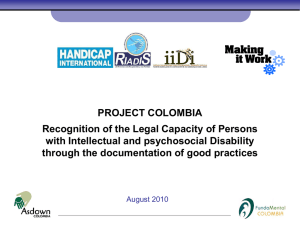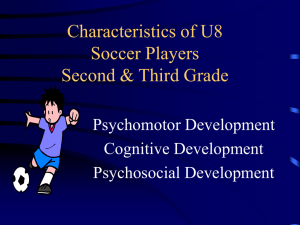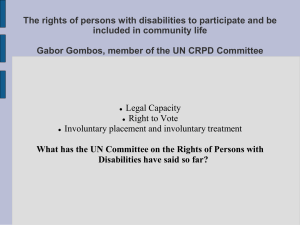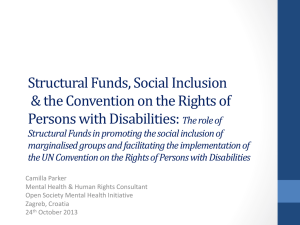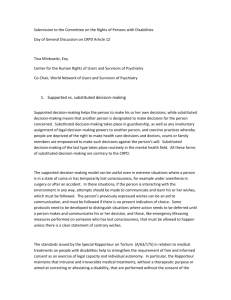ENUSP Proposals for the List of issues on the European Union
advertisement
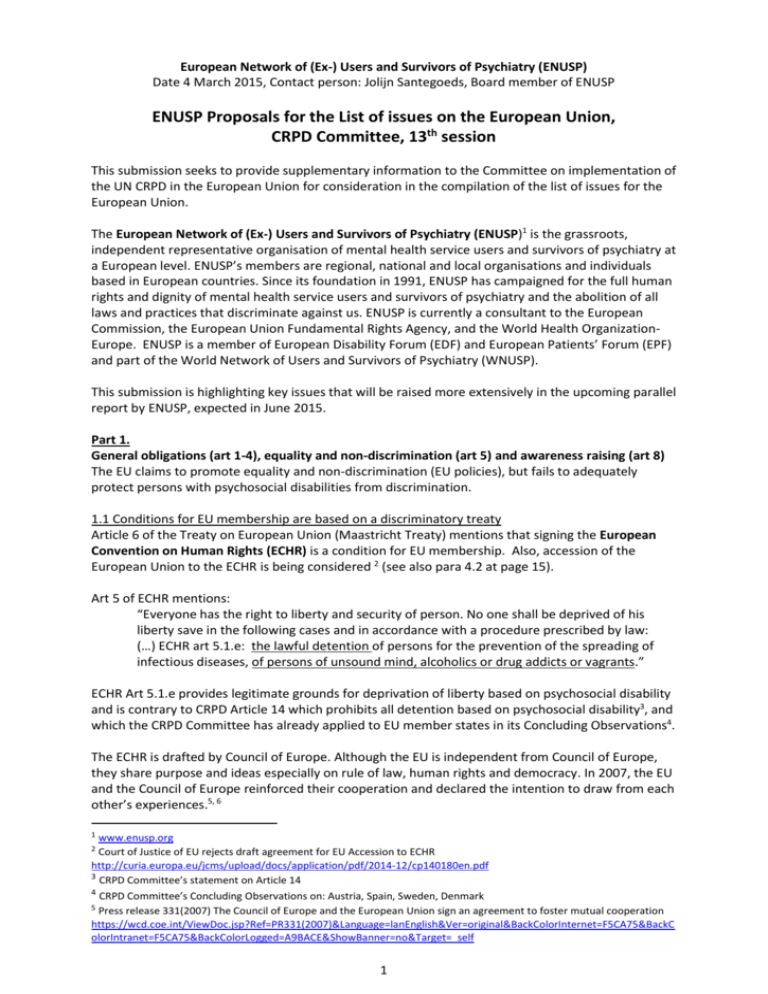
European Network of (Ex-) Users and Survivors of Psychiatry (ENUSP)
Date 4 March 2015, Contact person: Jolijn Santegoeds, Board member of ENUSP
ENUSP Proposals for the List of issues on the European Union,
CRPD Committee, 13th session
This submission seeks to provide supplementary information to the Committee on implementation of
the UN CRPD in the European Union for consideration in the compilation of the list of issues for the
European Union.
The European Network of (Ex-) Users and Survivors of Psychiatry (ENUSP)1 is the grassroots,
independent representative organisation of mental health service users and survivors of psychiatry at
a European level. ENUSP’s members are regional, national and local organisations and individuals
based in European countries. Since its foundation in 1991, ENUSP has campaigned for the full human
rights and dignity of mental health service users and survivors of psychiatry and the abolition of all
laws and practices that discriminate against us. ENUSP is currently a consultant to the European
Commission, the European Union Fundamental Rights Agency, and the World Health OrganizationEurope. ENUSP is a member of European Disability Forum (EDF) and European Patients’ Forum (EPF)
and part of the World Network of Users and Survivors of Psychiatry (WNUSP).
This submission is highlighting key issues that will be raised more extensively in the upcoming parallel
report by ENUSP, expected in June 2015.
Part 1.
General obligations (art 1-4), equality and non-discrimination (art 5) and awareness raising (art 8)
The EU claims to promote equality and non-discrimination (EU policies), but fails to adequately
protect persons with psychosocial disabilities from discrimination.
1.1 Conditions for EU membership are based on a discriminatory treaty
Article 6 of the Treaty on European Union (Maastricht Treaty) mentions that signing the European
Convention on Human Rights (ECHR) is a condition for EU membership. Also, accession of the
European Union to the ECHR is being considered 2 (see also para 4.2 at page 15).
Art 5 of ECHR mentions:
“Everyone has the right to liberty and security of person. No one shall be deprived of his
liberty save in the following cases and in accordance with a procedure prescribed by law:
(…) ECHR art 5.1.e: the lawful detention of persons for the prevention of the spreading of
infectious diseases, of persons of unsound mind, alcoholics or drug addicts or vagrants.”
ECHR Art 5.1.e provides legitimate grounds for deprivation of liberty based on psychosocial disability
and is contrary to CRPD Article 14 which prohibits all detention based on psychosocial disability3, and
which the CRPD Committee has already applied to EU member states in its Concluding Observations4.
The ECHR is drafted by Council of Europe. Although the EU is independent from Council of Europe,
they share purpose and ideas especially on rule of law, human rights and democracy. In 2007, the EU
and the Council of Europe reinforced their cooperation and declared the intention to draw from each
other’s experiences.5, 6
1
www.enusp.org
Court of Justice of EU rejects draft agreement for EU Accession to ECHR
http://curia.europa.eu/jcms/upload/docs/application/pdf/2014-12/cp140180en.pdf
3
CRPD Committee’s statement on Article 14
4
CRPD Committee’s Concluding Observations on: Austria, Spain, Sweden, Denmark
5
Press release 331(2007) The Council of Europe and the European Union sign an agreement to foster mutual cooperation
https://wcd.coe.int/ViewDoc.jsp?Ref=PR331(2007)&Language=lanEnglish&Ver=original&BackColorInternet=F5CA75&BackC
olorIntranet=F5CA75&BackColorLogged=A9BACE&ShowBanner=no&Target=_self
2
1
1.2 EU is promoting discrimination by embracing a sequence of inadequate frames and mechanisms
The EU claims to protect the rights of its citizens by several independent European mechanisms.
However, the stigmatizing language in the main European treaty (ECHR, art 5.1.e) has laid the basis
for a larger sequence of discriminatory policies and practices across the EU, including by independent
European mechanisms, leading to ongoing discrimination and abuse, and inadequate European
guidelines and policy standards concerning the rights of persons with psychosocial disabilities. By
using the European Convention, and subsequently the sequence of European mechanisms, the EU is
actually taking part in promoting and facilitating exclusion and institutionalization:
-
1.2.1 EU maintains several conventions without proper adjustment to norms prescribed by
the CRPD, such as:
o Council of Europe - European Convention on Human Rights, art 5.1.e
o Council of Europe - Convention on Human Rights and Biomedicine (Oviedo
Convention), which prescribes binding standards that run contrary to the CRPD, such
as, amongst others:
substitute decision-making “because of a mental disability, a disease or for
similar reasons” under “protection of persons not able to consent” (art 6),
non-consensual interventions and treatment without consent under
“protection of persons who have a mental disorder” (art 7),
substitute decision-making for “persons not able to consent” on scientific
research and organ removal as a living donor (art 17,20)
o
-
In May 2013, the Council of Europe- Committee on Bioethics (DH-BIO) has started
work, with the assistance of a Drafting Group, on the preparation of a draft
Additional Protocol to the Convention on Human Rights and Biomedicine (Oviedo
Convention), concerning the protection of the human rights and dignity of persons
with mental disorders with regard to involuntary placement and involuntary
treatment. This work is based on the existing provisions of the Convention on
Human Rights and Biomedicine (CETS n°164) and of the European Convention on
Human Rights (CETS n° 5).7 A preliminary draft was expected in May 2014,8 but
cannot be found in the public domain yet.
EU Fundamental Rights Agency (FRA, see also next para 1.2.3) Director Mr.
Morten Kjaerum commented on the draft Additional Protocol in June 2014 at
the 81st Steering Committee for Human Rights (CDDH) meeting, Council of
Europe, Strasbourg: “FRA has contributed to processes at the Council of
Europe as part of the EU response on the preliminary draft Additional
Protocol to the Convention on human rights and biomedicine. Drawing on
our work on involuntary placement and treatment of people with mental
health problems, FRA highlighted the importance of reflecting the profound
changes in human rights protection for persons with disabilities brought
about by the UN CRPD. All States Parties to the CRPD will need to harmonise
their existing legislation with CRPD standards. In our view, this could make
adopting the draft Additional Protocol in its current form a challenge for
those Member States which have ratified the CRPD.” 9
1.2.2 EU maintains a framework of jurisprudence and monitoring without proper adjustment
to norms prescribed by the CRPD:
o Jurisprudence of the European Court of Human Rights (ECtHR) is based on ECHR.
6
Memorandum of Understanding between the Council of Europe and the European Union
https://wcd.coe.int/ViewDoc.jsp?id=1130667&BackColorInternet=DBDCF2&BackColorIntranet=FDC864&BackColorLogged=
FDC864
7
http://mdac.org/sites/mdac.org/files/ingos_e3.pdf
8
http://www.coe.int/t/dghl/standardsetting/cddh/CDDH-DOCUMENTS/CDDH(2014)002_EN.pdf
9
http://fra.europa.eu/en/speech/2014/intervention-mr-morten-kjaerum-steering-committee-human-rights-cddh
2
o
-
ECtHR continues to apply art. 5.1.e to endorse and tolerate mental health
detention, which violates the right to liberty under CRPD Article 14.
ECtHR has interpreted Article 3 on freedom from torture and ill-treatment to
permit restraint and forced psychiatric drugging based on a doctrine of
“medical necessity” 10 which has been repudiated by the UN Special
Rapporteur on Torture11.
Monitoring of human rights of persons detained in institutions is done by the
European Committee for the Prevention of Torture and Inhuman or Degrading
Treatment or Punishment (CPT, established by Council of Europe) and is based on
ECHR art 3. The CPT still uses outdated standards12 which allow for substitute
decision-making, involuntary placement and treatment, and seclusion and restraints,
contrary to the CRPD. CPT’s standards on involuntary placement:
“The procedure by which involuntary placement is decided should offer
guarantees of independence and impartiality as well as of objective medical
expertise. […] the formal decision to place a person in a psychiatric hospital
should always be based on the opinion of at least one doctor with psychiatric
qualifications, and preferably two, and the actual placement decision should
be taken by a different body from the one that recommended it”. (more on
CPT in paragraph 4.3)
1.2.3 EU maintains structures, directives, policies, guidelines, etc. without proper
adjustment to the norms of the CRPD:
o Within the EU and its member states, the Council of Europe Committee of Ministers
- Recommendation Rec(2004)10 concerning the protection of the human rights and
dignity of persons with mental disorder13 is binding European law, which links
“protection of vulnerable persons with a mental disorder” to non-consensual
interventions, involuntary placement and treatment, and substitute decision-making,
which is in line with CoE standards, but is contrary to the UN CRPD, mentioning:
Guidelines for involuntary placement and involuntary treatment (para. III),
Guidelines for substitute decision-making for “persons with mental disorder
who do not have the capacity to consent” (para. IV),
Guidelines for the application of restraint and seclusion and non-consensual
irreversible and intrusive treatment (para. V)
Policy and developments at relevant EU institutions:
o European Commission (having legislative initiative) – Mental Health Policy14:
The European Commission’s Green Paper on improving the mental health of
the population (2005) 15 served to launch a debate, and mentioned briefly
the issue of compulsory placement and involuntary treatment as an option
of “last resort”. The EC Green Paper was followed by:
The European Pact for Mental Health and Well-Being (2008-2011)16 and the
EU Compass for Action on Mental Health and Well-being17, and the Joint
Action on Mental Health and Well-being (2013-16)18, which cover five
10
Herczegfalvy
Nowak para 49, Mendez
12
European Committee on the Prevention of Torture (CPT) – The CPT standards:
http://www.cpt.coe.int/en/documents/eng-standards-scr.pdf
13
Recommendation Rec(2004)10 https://wcd.coe.int/ViewDoc.jsp?id=775685
14
http://ec.europa.eu/health/mental_health/policy/index_en.htm
15
EC Green Paper: http://ec.europa.eu/health/ph_determinants/life_style/mental/green_paper/mental_gp_en.pdf
16
European Pact for Mental Health and Well-Being http://ec.europa.eu/health/mental_health/docs/mhpact_en.pdf
17
EU Compass for Action on Mental Health and Well-being
http://ec.europa.eu/health/mental_health/eu_compass/index_en.htm
18
Joint Action on Mental Health and Well-being http://www.mentalhealthandwellbeing.eu/
11
3
priority areas for mental health and wellbeing in the European Union and its
member states:
1. Depression, suicide and E-Health
2. Community based approaches,
3. Mental health at workplaces,
4. Mental health in schools,
5. Mental health in all policies,
The Mental Health Policy of the European Commission does not mention any
priority or action against substitute decision-making, involuntary placement
or involuntary treatment. The serious human rights violations by forced
institutionalization and forced treatments of persons with psychosocial
disabilities seems to get no attention at EU policy level, despite ratifying the
CRPD (more on European Commission’s Mental Health Policy in para 3.6).
o
-
EU Fundamental Rights Agency19, a decentralized EU agency established in 2007,
collects and analyses data, and provides expert advice to assist EU institutions and
EU Member States in understanding and tackling challenges to safeguard the
fundamental rights of everyone in the EU. The FRA agency acknowledges several
human rights violations in light of the UN CRPD committed against persons with
psychosocial disabilities across the EU in their 2012 report on involuntary placement
and involuntary treatment of persons with mental health problems 20. However, the
FRA agency’s recommendations do not have any legal implication or legislative
initiative, which in fact means that the advancement of protection of fundamental
human rights in the EU is in practice reduced to a “good advice” instead of a right
that can be enforced.
1.2.4 EU maintains a discriminatory and paternalistic medical model approach in present
structures of funding.
o Funding by EU Structural Funds, is used to maintain institutionalization and
paternalistic medical model approaches across the EU. 21,22,23
The European mechanisms and policies - in varying severity- fail to protect and promote the human
rights of persons with psychosocial disabilities across the EU and EU member states. As a state party
to the UN CRPD, the EU has taken up a responsibility to ensure an adequate European human rights
framework which fully protects the rights of persons with psychosocial disabilities on an equal basis
with others, across the EU and EU member states.
19
http://fra.europa.eu/en/about-fra
EU FRA 2012 report: Involuntary placement and involuntary treatment of persons with mental health problems
http://fra.europa.eu/en/publication/2012/involuntary-placement-and-involuntary-treatment-persons-mental-healthproblems
21
European Coalition on Community Living (ECCL): 2010 report: “A wasted opportunity – wasted time, wasted money,
wasted lives” A Focus Report on how the current use of Structural Funds perpetuates the social exclusion of disabled
people in Central and Eastern Europe by failing to support the transition from institutional care to community-based
services, http://community-living.info/wp-content/uploads/2014/02/ECCL-StructuralFundsReport-final-WEB.pdf
22
UN OHCHR Regional office for Europe: 2012 report: Getting a life – Living Independently and Being Included in the
Community. A Legal Study of the Current Use and Future Potential of the EU Structural Funds to Contribute to the
Achievement of Article 19 of the UN CRPD. http://www.europe.ohchr.org/documents/Publications/getting_a_life.pdf
23
Open Society Foundation (OSF): 2012 report: The European Union and the Right to Community Living - Structural Funds
and the European Union’s Obligations under the UN CRPD
http://www.unhcr.org/refworld/type,REGIONALREPORT,,,4fbcc96d2,0.html
20
4
Proposed questions on articles 1-5
What steps is the EU taking to promote harmonization of the ECHR with the CRPD, and in
particular to nullify or derogate the Article 5.1.e provision authorizing detention on the
basis of psychosocial disability? In addition, what interim measures are being taken to
ensure that member states are applying the CRPD standard which prohibits all detention
and non-consensual treatment in mental health services, and that they are not relying on
ECHR Article 5.1.e to continue justifying these practices in direct contradiction to CRPD
Article 12 and 14?
Which steps are being taken by EU to adjust the conditions for EU membership to be in line
with the UN CRPD, especially regarding the provisions of ECHR art 5.1.e?
Which steps are being taken by EU to ensure that the CRPD standards for the protection of
the rights of persons with psychosocial disabilities supersede the Council of Europe standards
for the “protection of human rights and dignity of persons with mental disorder” within the
EU and in member states?
What steps will be taken by the EU in case the Additional Protocol to the Council of Europe
Convention on Human Rights and Biomedicine (Oviedo Convention) is demonstrated to be
not in line with the CRPD?
What steps is the EU taking to promote harmonization with the CRPD by independent
European mechanisms on which it relies to monitor and enforce the human rights of people
with disabilities?
What steps is the EU taking to ensure that its own policies and directives conform to the
CRPD, particularly with respect to CRPD Articles 12, 14 and 15, and the prohibition of
substitute decision-making, detention and institutionalization in mental health facilities, and
non-consensual treatment?
What steps is the EU taking to ensure meaningful involvement of persons with psychosocial
disabilities in the development and implementation of legislation, policies and other
decision-making processes at EU level and in EU member states, including which steps is the
EU taking to ensure that persons with psychosocial disabilities are enabled to organize and
represent themselves through their respective local, regional, national and European
organizations?
Proposed question on article 8
Which steps are taken by EU to ensure that a perceived or actual diagnosis or disability does
not lead to a loss of fundamental human rights for EU citizens, and to counter the profiling of
stereotypes and stigmatization of persons with psychosocial disabilities, including by ending
doctrines of “unsound mind”, “danger to self or others”, “need for treatment”, and
“incapable of consenting”, across all layers of the EU?
Proposed questions on art 7 are included at paragraph 2.7, page 9.
Proposed questions on art 9 are included in paragraph 3.1, page 10.
5
Part 2.
Right to life (art 10), Equal recognition before the law (art 12), Liberty and security of the person
(art 14), Freedom from torture or cruel, inhuman or degrading treatment or punishment (art 15),
Freedom from exploitation, violence and abuse (art 16), Protecting the integrity of the person (art
17) and Access to Justice (art 13)
Involuntary treatment is widespread across the EU.
Involuntary/forced treatments are executed against the will of persons with psychosocial disabilities
on a large scale throughout all EU member states.24
Several binding European mechanisms by the Council of Europe provide guidelines for involuntary
treatment (see Part 1), which carry a wrong signal to member states as if involuntary treatments
could be a so-called “good practice”, instead of it being recognized as a core human rights violation.
These guidelines invoke the practice of involuntary treatments.
As a form of violence against persons with psychosocial disabilities, psychiatric institutionalization
and forced interventions, including forced drugging and electroshock, solitary confinement and
restraint, forced body cavity searches, etc., are devastating and have a terrible cost to humanity in
lives lost, psychic and physical harm, destruction of family relationships and curtailment of
opportunities for education, work and recognition of one’s achievements and potential.
Despite the significant shift in international law brought about by the CRPD, EU States Parties have
not moved to abolish by law these violent practices. EU member states have not enacted laws
prohibiting these acts of violence, but instead have enacted laws authorizing them, giving rise to
state responsibility for acts amounting to torture and ill-treatment.
Even after signing or ratifying the CRPD, several of the EU countries have continued to draft laws that
allow for substitute decision-making and forced interventions25, flagrantly violating their obligations
as States Parties or Signatories to this treaty.
2.1 Deadly psychiatric interventions
ENUSP members report on dreadful practices throughout the EU, where institutionalization and
forced psychiatric interventions, including the direct use of force, violence, restraints, medication and
negligence has caused the death of persons with psychosocial disabilities. Exact numbers are
unknown, but according to the information of ENUSP members, it appears that in every EU country
cases of deadly psychiatric interventions on persons with psychosocial disabilities are known, and in
some institutions mortality rates are significant. Some of these cases are reported in the media. The
upcoming ENUSP Parallel report will give more information on deadly psychiatric interventions in the
EU.
In the large majority of these cases there is impunity for the psychiatric (or other) staff who
perpetrated or directly participated in the intervention that directly led to the death of the person
with psychosocial disabilities, as is reported by ENUSP members and other sources in various EU
member states.
In 2014, the European Court of Human Rights for the first time recognized a violation of the Right to
Life due to inadequate psychiatric treatment, in the case of Câmpeanu v. Romania.26 ENUSP hopes
24
EU Fundamental Rights Agency (FRA), 2012 report: Involuntary placement and involuntary treatment of persons with
mental health problems: http://fra.europa.eu/en/publication/2012/involuntary-placement-and-involuntary-treatmentpersons-mental-health-problems
25
Amongst others: France, Ireland, the Netherlands, Norway are States Parties or Signatories to CRPD that have enacted or
are considering draft mental health legislation that maintains forced psychiatric interventions and institutionalization.
6
that this judgement will result in a better protection of the lives of persons with psychosocial
disabilities.
Proposed questions on article 10
Which steps will the EU take to protect the lives of persons at risk of dying by forced or
otherwise harmful psychiatric interventions or other violence in the EU and its member
states?
What steps will the EU take to ensure that persons who engage in actions, including
psychiatric interventions, which result in the death of persons with psychosocial disabilities,
including when they are psychiatric or other staff, are held responsible for these actions
under the domestic and European law?
2.2 Substitute decision-making and guardianship regimes for persons with psychosocial disabilities
exist in all EU member states. Plenary substitute decision-making exists in at least 25 EU member
states27 . The EU institutions and EU governments have legal obligations towards upholding human
rights including the CRPD as the highest applicable international law on the rights of persons with
disabilities.28 ,29 (also see Part 4).
The ECHR does not explicitly guarantee the right to legal capacity. The European Court on Human
Rights has read the right to legal capacity into Article 8 of the ECHR: Respect for private and family
life.30 ECHR Article 8 adopts a liberal perspective towards a person’s private choices and protects
against arbitrary State interference. Since the right to legal capacity has been connected via this
provision to the right to respect for private and family life, home and correspondence, if State
interference does not impinge upon these areas, then no infringement of the right to legal capacity is
seen. Consequently, the manner in which the presence or absence of legal capacity impacts on other
rights has not been exposed and recognised.
Proposed questions on article 12
Which steps are being taken by EU to ensure that EU member states repeal all forms of
guardianship and substitute decision-making and that they promote and realise support
systems which respect the will and preferences of the person concerned?
Which steps are taken by EU to adopt a legal framework which enforces that involuntary
treatment is a human rights violation and not a “good practice” within the EU, and which
enforces a prohibition against involuntary treatment and involuntary institutionalization,
which violate the human rights of people with psychosocial disabilities under the CRPD?
What steps are being taken by the EU to adopt a legal framework that explicitly protects the
right to legal capacity for all persons, including all persons with psychosocial disabilities on an
equal basis? And in addition, which steps are being taken by the EU to address the key role of
the right to legal capacity conditional for the enjoyment of other rights, and to ensure that
violations of the right to legal capacity against persons with psychosocial disabilities are
recognized, prohibited and remedied?
26
European Court of Human Rights, judgement on violation of the Right to Life (art 2 ECHR) by inadequate psychiatric
treatment in Romania, 2014 Application No. 47848/08, submitted by the Romanian NGO CLR on behalf of Mr Câmpeanu:
http://hudoc.echr.coe.int/sites/eng/pages/search.aspx?i=001-145577#{"itemid":["001-145577"]}
27
Mental Health Europe (MHE): 2012 report: Mapping Exclusion, p22.
28
EU website, How the EU works, Human rights and equality: http://europa.eu/about-eu/index_en.htm
29
EU website, How the EU works, Human rights and equality: http://europa.eu/about-eu/index_en.htm
30
Shtukaturov v Russia, Application no. 44009/05, judgment of 27 March 2008, para 90
7
2.3 Deprivation of liberty based on psychosocial disabilities, either in itself, or in combination with
other criteria such as presumed dangerousness or need for treatment, is taking place in all EU
member states.31
Proposed questions on article 14
Which steps are being taken by EU to ensure liberty and security of persons with
psychosocial disabilities across the EU on an equal basis with others, and to ensure that
institutionalization and treatment without the free and informed consent of persons with
psychosocial disabilities is repealed?
Which steps are being taken by EU to ensure that member states repeal legal provisions that
authorize deprivation of liberty based on a psychosocial disability, including provisions in
Mental Health Acts that characterize individuals as being in need of care or treatment or as
being likely to cause harm to themselves or others, and including provisions that allow third
parties such as guardians or family members to consent to hospitalization or
institutionalization on the person’s behalf?
How will the EU promote compliance by its member states with the prohibition of detention
or compulsory treatment in mental health services that is found in CRPD Article 14?
2.4 Torture and cruel inhuman or degrading treatment and punishment are taking place against
persons with psychosocial disabilities across all EU member states.
The European binding conventions and directives (ECHR, Oviedo Convention, Rec(2004)10) allow for
forced treatments and interventions, including long-term deprivation of liberty, the use of solitary
confinement, restraint and non-consensual irreversible and intrusive treatments, including nonconsensual administration of psychotropic medication, non-consensual electroconvulsive therapy
(ECT) and non-consensual abortion and sterilization of persons with psychosocial disabilities.
The independent European mechanisms to monitor and enforce human rights in Europe (ECtHR, CPT)
still maintain the doctrine of “medical necessity” to allow the deprivation of rights of persons with
psychosocial disabilities, based on art 5.1.e of ECHR, the Oviedo convention and the jurisprudence of
the European Court of Human Rights under ECHR article 3. This remains the case while current
human rights standards of the UN require a ban on involuntary psychiatric treatments, as declared by
the CRPD Committee in General Comment No. 1 paragraph 42, and by the Special Rapporteur on
Torture in paragraph 89(b) of his 2013 thematic report32.
Proposed question on article 15
Which steps are being taken by EU to ensure that an absolute ban on all forced medical
interventions against persons with disabilities, including a ban on solitary confinement,
restraints, non-consensual administration of electroconvulsive therapy (ECT), non-consensual
administration of psychiatric and other medication, forced body cavity searches, forced
abortion and forced sterilization, is enacted and enforced in all member states in the EU?
31
EU Fundamental Rights Agency (FRA), 2012 report: Involuntary placement and involuntary treatment of persons with
mental health problems: http://fra.europa.eu/en/publication/2012/involuntary-placement-and-involuntary-treatmentpersons-mental-health-problems
32
A/HRC/22/53 Special Rapporteur on Torture (Mendez), 2013 thematic report: Torture in health care settings
http://www.ohchr.org/Documents/HRBodies/HRCouncil/RegularSession/Session22/A.HRC.22.53_English.pdf
8
2.5 Protecting the integrity of the person
The medical model-approach of “persons of unsound mind” gave rise to a biomedical industry, which
has developed many harmful, invasive and irreversible treatments, such as electroconvulsive therapy
(ECT), neuroleptics and other harmful psychopharmaceutic drugs, with the aim to correct the
disability. The biomedical explanation of the word ‘dignity’ is often misused against persons with
psychosocial disabilities in order to promote non-consensual invasive and irreversible interventions
aimed at repairing, correcting or alleviating a psychosocial disability, instead of the human rights
based approach to dignity as the lived experience of the person.
Proposed question on article 17
What is EU doing to promote the human rights based concept of dignity of a person with
psychosocial disabilities, and to prohibit the wrongful biomedical paradigm of ‘dignity’
depending on health status?
2.6 The problem of access to justice
Stigma and exclusion impose significant barriers on access to justice for persons with psychosocial
disabilities across EU member states. The incapacity-approach towards persons with psychosocial
disabilities generally results in a culture of procedures and attitudes that do not take persons with
psychosocial disabilities seriously as litigants for the protection of their human rights in the courts,
which prevents access to justice.
Additionally, since the ECHR, the Oviedo Convention, and CoE directives such as Rec(2004)10, are
required to be incorporated into the domestic law of member states of the CoE, which include all
member states of the EU, both at the European level and at the domestic level, the existence of legal
norms contrary to the CRPD is an insurmountable barrier to access to justice for people with
psychosocial disabilities, and results in impunity for serious and widespread human rights violations.
The ECHR and the European policies and mechanisms based on it clearly fail to protect the rights of
persons with psychosocial disabilities to equal recognition before the law, liberty and security of the
person, and freedom from torture and ill-treatment, and yet, the EU still embraces these instruments
and mechanisms as a framework for justice on universal human rights.
Abolition of the offending laws is a first and necessary step in reparations. In addition, reparations
and remedies for the harm that has already been committed must be provided as set out in the Basic
Principles and Guidelines on the Right to a Remedy and Reparations for Victims of Gross Violations
on Human Rights and Serious Violations of International Humanitarian law of 2006.33
Proposed questions on article 13
Which steps are being taken by the EU to ensure legal accountability and remedies at the
European level and at the domestic level for acts that violate the human rights of persons
with disabilities, including widespread and severe violations of the rights to recognition
before the law, liberty and security of the person, and freedom from torture and illtreatment?
2.7 Children with psychosocial disabilities
Throughout the EU member states, a large number of children with psychosocial disabilities are
subjected to forced psychiatric measures that are harmful to their wellbeing and development, such
as institutionalization and mind-altering psychopharmaceutic medication aimed at correcting or
alleviating the psychosocial disability without the free and informed consent of the child.
33
A/RES/60/147.
9
Proposed questions on article 7
Which steps are being taken by the EU to ensure that in EU member states, children with
psychosocial disabilities are not deprived of their evolving legal capacity or their liberty based
on psychosocial disability, and to ensure that any violation of these rights in the EU is
sanctioned?
Which steps are being taken by the EU to ensure that children with disabilities enjoy
protection of the integrity of the person, including protection against treatments, including
the administration of psychopharmaceutic medication, to correct a psychosocial disability
without the free and informed consent of the child concerned?
Which measures are taken by the EU to prohibit all forms of non-consensual psychiatric
interventions on children with psychosocial disabilities?
Which steps are being taken by the EU to ensure effective access to justice for children with
psychosocial disabilities, including when deprived of the legal capacity to which they are
entitled on an equal basis with other children by national legislation in member states?
10
Part 3.
Accessibility (art 9), Living independently and being included in the community (art 19), Freedom
of expression and opinion, and access to information (art 21), Respect for privacy (art 22), Respect
for home and the family (art 23), Education (art 24), Health (art 25), Habilitation and rehabilitation
(art 26), Work and employment (art 27), Adequate standard of living and social protection (art 28),
Participation in political and public life (art 29), Participation in cultural life, recreation, leisure and
sport (art 30)
3.1 Inaccessibility and segregation
In many EU member states, citizens with psychosocial disabilities are either institutionalized (with or
without consent, for short or long term) or left without sufficient support in the community. In most
EU member states no alternative option to the medical model is available.
By the nature of confinement in social care institutions, segregation and separation from society,
persons with psychosocial disabilities are denied the right to participate in community life,
interacting with people of their choosing and establishing and maintaining relations with other
human beings and the outside world.34 The negative effects of institutionalisation- the lack of
activities, stimulation, interaction with the wider community, self-determination, self-actualisation have been widely recognised.
Even when not institutionalized, persons with psychosocial disabilities face a large amount of barriers
in regards to participation and inclusion in the community. Overall, stigma, fear and discrimination
towards persons with psychosocial disabilities are widespread and embedded in the communities in
the EU. The lack of care in the community hinders one's ability to pursue, enrich and fulfil their
personality and personal development through participation and membership in the life of the
community.
The upcoming parallel report of ENUSP will give more information on the variety of discriminatory
practices against persons with psychosocial disabilities in communities across the EU.
Proposed question on article 9
Which measures are being taken by EU to prevent ongoing segregation and exclusion across
the EU and to remedy the lack of community support, emphasizing alternatives to the
medical model of mental health in EU member states?
3.2 De-institutionalization and inclusion
As a result of history up to today (also known as the ‘Great Confinement’), persons with psychosocial
disabilities have traditionally not been part of diversity in the communities across the EU so far.
Currently, under the flag of de-institutionalization initiatives, several institutional habits are finding a
way into the community, such as segregation in smaller-sized institutions, sheltered unpaid
/underpaid work, and outpatient forced treatment such as Community Treatment Orders (CTOs),
which implies conditional liberty, and which continues to result in side-lining, marginalization and
violation of the rights of persons with psychosocial disabilities.
Niemietz v Germany, Application no 13710/88, judgment of 16 December 1992, para 29; Sidabras and Dziautas v Lithuania,
Applications nos. 55480/00 and 59330/00, judgment of 27 April 2004, para 43
34
11
Proposed questions on article 19
Which steps are taken by EU to ensure clear guidance to de-institutionalization and inclusion
across the EU, and to ensure that EU Structural Funds cannot be used for initiatives that
maintain social inequality and segregation of persons with psychosocial disabilities?
What steps are being taken by the EU to combat outpatient forced treatment orders such as
Community Treatment Orders (CTOs) and to ensure that all mental health services are
provided based on the free and informed consent of the person concerned?
Which steps are being taken by EU to enforce that inclusion is a human right for persons with
psychosocial disabilities in the EU?
Proposed question on article 23
What steps are taken by the EU to stop forced family separation of persons with psychosocial
disabilities, based on psychosocial disability? And in addition, what is EU doing to realise and
promote support for parenthood for persons with psychosocial disabilities, and to prevent
forced family separation on the basis of psychosocial disability?
Proposed question on article 26
Which steps are being taken by EU to ensure that persons with psychosocial disabilities can
attain and maintain their full potential in all aspects of life in the EU, and that voluntary
community based services are in place in EU member states, which support the person to
attain and maintain maximum independence, ability, inclusion and participation in all aspects
of life, in accordance with the will and preferences of the person concerned?
3.5 Right to health and community based support
Across the EU, many non-consensual medical interventions are performed without the free and
informed consent of the person concerned, including non-consensual administration of psychotropic
medication, electroconvulsive therapy (ECT) and forced abortion. In many EU member states
national legislation allows for substitute decision-making in regard of medical interventions on
persons with psychosocial disabilities. Non-consensual medical interventions on persons with
psychosocial disabilities are generally aimed at correcting or alleviating (the consequences of) a
psychosocial disability, in order to nullify the social support needs of persons with psychosocial
disabilities instead of supporting the wellbeing of the person concerned.
Proposed questions on article 25
Which steps are taken by the EU to ensure that all mental health services are provided based
on the free and informed consent of the person concerned, and that violation of this right is
effectively prohibited in the EU?
Which steps are being taken by the EU to ensure high quality services for persons with
psychosocial disabilities in the community, which support the wellbeing of the person
concerned in accordance with the will and preferences of the person concerned in EU
member states?
Which steps are being taken by the EU to ensure that mental health services adhere to the
core principle of “doing no harm”? In addition, which steps are taken by the EU to support
alternatives to the medical model of mental health, including peer support?
12
3.6 Right to education, Work and employment, and Adequate standard of living and social protection
The Mental Health Policy of the European Commission does cover the areas of mental health in
youth and education and mental health in workplace settings (also see para 1.2.3), however it is
mainly focussing on promoting mental health at these locations and the prevention of mental health
problems, and falls short in protecting the rights of all persons with psychosocial disabilities.
Proposed questions on article 24, 27 and 28
What steps are taken by the EU to revise the Mental Health Policy of the European
Commission, in order to move away from a location-bound approach of mental health and to
ensure a human rights-based approach in the protection of the rights of persons with
psychosocial disabilities in all aspects of life?
What steps are taken by the EU to guarantee that persons with psychosocial disabilities are
not discriminatorily denied access to education, work and employment based on
psychosocial disability in EU member states?
Which steps are being taken by the EU to ensure reasonable accommodation in all aspects of
education, hiring and employment practices, including which steps are being taken to
examine the experiences of persons with psychosocial disabilities in EU member states with
respect to education and employment to develop specific recommendation for policies and
guidelines as to reasonable accommodation as well as measures to eliminate institutional
and attitudinal discrimination?
What steps are taken by the EU to guarantee that all persons with psychosocial disabilities
receive payment, rights and benefits for work and employment on an equal basis with others
in EU member states?
What steps are taken by the EU to ensure that persons with psychosocial disabilities have an
adequate standard of living on an equal basis with others, including access to sufficient
income to obtain independent living detached from any services?
3.7 Participation in political life
Proposed questions on article 29
What steps are taken by the EU to ensure inclusion of all persons with psychosocial
disabilities in the EU for the European and local voting processes?
How will the EU ensure that persons with psychosocial disabilities have access to resources
to organize and represent themselves through their respective local, regional, national and
European organizations? And in addition, how will the EU guarantee that the 20-80 ratio for
European funding35 does not constitute a barrier for the respective organizations of persons
with psychosocial disabilities, especially when they may not have any other resources?
35
European funding requires that applicants have 20% of the total budget of the funding application themselves, and
European funding can supply the remaining 80% of the total budget of the funding application.
13
Part 4.
Statistics and data collection (art 31), International cooperation (art 32), and National
implementation and monitoring (art 33)
4.1 “Nothing about us, without us”
David Webb (2010): “The essential experiential data of consciousness are subjective, invisible and
unmeasurable first-person data which cannot be reduced to third-person data without losing their
most important properties, which are the subjective value and meaning of an experience to those
who live it. The reductive, third-person methods of traditional science will simply not help us to
understand, describe and explain the first-person, lived experience of consciousness. “
Beresford and Boxall (2013): “The dominant epistemology has worked to prohibit mental health
service users from being producers or knowers of their own knowledges. Psychiatric knowledge has
been based on the ‘knowledge claims’ of others about the experience of mad people and mental
health service users. They have played the key role in interpreting service users’ experience, while
the latter’s own interpretations have, as has been argued, been excluded or devalued.”
Maria Liegghio (2013). “For psychiatrized people, being constructed as ‘incompetent’ and
‘dangerous’ becomes a powerful mechanism leading to their disqualification as legitimate knowers”.
“[Epistemic violence] is a very denial of a person’s legitimacy as a knower – their knowledge and their
ways of knowing – that renders that person out of existence, unable to be heard and to have their
interest count.”
Proposed question on article 31:
Which steps are being taken by the EU to eliminate epistemic violence towards persons with
psychosocial disabilities, and to ensure that the lived experience of persons with
psychosocial disabilities plays a key role in data collection, research, implementation and
monitoring of the rights of persons with psychosocial disabilities?
4.2 Implementation of the rights of persons with psychosocial disabilities in the EU
The EU, the EU institutions and the EU governments have legal obligations to uphold human rights.
The EU states:
“One of the EU’s main goals is to promote human rights both internally and around the
world. Human dignity, freedom, democracy, equality, the rule of law and respect for human
rights: these are the core values of the EU. Since the 2009 signing of the Treaty of Lisbon, the
EU's Charter of Fundamental Rights36 brings all these rights together in a single document.
The EU's institutions are legally bound to uphold them, as are EU governments whenever
they apply EU law.” 37
In 2012, the EU Fundamental Rights Agency (FRA) published a critical report on Involuntary
placement and involuntary treatment of persons with mental health problems 38, stating:
“The paradigm shift to a rights-based approach to disability encapsulated by the CRPD poses
potential challenges for the existing legal frameworks governing involuntary placement and
involuntary treatment. This has significant implications for the European Union (EU) and its
Member States. (…) As the CRPD Committee starts to develop its interpretation of the
convention on the basis of State Party reports, the key fundamental rights questions associated
with compulsory placement and treatment will be brought into ever sharper focus. These
36
Charter of Fundamental Rights of the European Union http://eurlex.europa.eu/LexUriServ/LexUriServ.do?uri=OJ:C:2010:083:0389:0403:EN:PDF
37
EU website, How the EU works, Human rights and equality: http://europa.eu/about-eu/index_en.htm
38
EU Fundamental Rights Agency (FRA), 2012 report: Involuntary placement and involuntary treatment of persons with
mental health problems, http://fra.europa.eu/sites/default/files/involuntary-placement-and-involuntary-treatment-ofpersons-with-mental-health-problems_en.pdf
14
questions will have to be addressed by EU Member States as they assess the compliance of their
current and proposed legislation with the CRPD. The further development of EU law and policy,
including in the area of non-discrimination, could play a major role in this process.”
The focal point for implementation of the CRPD in the EU is the European Commission’s Unit on the
Rights of Persons with Disabilities39. The Council Working Group on Human Rights (COHOM) 40 has
been established as the formal coordination mechanism with the Member States. The Group is
responsible for human rights issues in the EU’s external relations and does not have a mandate to
work on EU internal human rights issues, which is the mandate of the Working Party on Fundamental
Rights, Citizens’ Rights and Free Movement of Persons (FREMP).
The Working Party on Fundamental Rights, Citizens’ Rights and Free Movement of Persons
(FREMP) has been established to secure compliance with the Charter of Fundamental Rights of the
European Union, also in connection with preparatory work in the legislative procedures of the
Council. FREMP also considers the question of the EU’s accession to the European Convention on
Human Rights41 even though the ECHR, especially article 5.1.e, is not in line with the CRPD (also see
the questions raised at Part 1, page 5). The Court of Justice of the EU delivered its opinion on the
draft agreement on the accession of the European Union to the European Convention for the
Protection of Human Rights and Fundamental Freedoms and identifies problems with regard to its
compatibility with EU law. 42
Proposed questions on article 33 (also see next page):
What steps has the EU taken to ensure that the focal point and coordination mechanism has
a mandate and resources to follow the FRA recommendation and develop EU law and policy
to end involuntary confinement, involuntary treatment, and all forms of substitute decisionmaking in compliance with the jurisprudence of the CRPD under Articles 12, 14 and 15,
including General Comment No. 1 and the Concluding Observations issued by the CRPD
Committee to EU member states?
What steps are taken by the EU to ensure that accession of the European Union to the
European Convention on Human Rights does not conflict with the ratification of the CRPD,
and in particular what measures are being taken to nullify or derogate the ECHR Article 5.1.e
provision authorizing detention on the basis of psychosocial disability, and which steps to
ensure that member states are applying the CRPD standard which prohibits all detention and
non-consensual treatment in mental health services, and that they are not relying on ECHR
Article 5.1.e to continue justifying these practices in direct contradiction to CRPD Article 12
and 14?
4.3 Monitoring of the rights of persons with psychosocial disabilities in the EU
The EU Framework Programme Evaluation and Monitoring 43 undertakes activities for EU
Framework Programmes evaluation and monitoring to support the implementation and
management of the EU Framework Programmes (FP) and the development of research policy.
Besides that, the European mechanism for monitoring the human rights of persons deprived of their
liberty, including in mental health care institutions, is the European Committee for the Prevention of
39
European Commission’s Unit on the Rights of Persons with Disabilities
http://ec.europa.eu/social/main.jsp?catId=1137&langId=en
40
EU Council Working Group on Human Rights, http://eeas.europa.eu/human_rights/workgroup/index_en.htm
41
http://register.consilium.europa.eu/doc/srv?l=EN&f=ST%2016573%202012%20INIT
42
Court of Justice of EU rejects draft agreement for EU Accession to ECHR
http://curia.europa.eu/jcms/upload/docs/application/pdf/2014-12/cp140180en.pdf
43
EU Framework Programme Evaluation and Monitoring, http://ec.europa.eu/research/evaluations/index_en.cfm
15
Torture and Inhuman or Degrading Treatment or Punishment (CPT, established by Council of
Europe).
The CPT still uses outdated standards which allow for substitute decision-making and involuntary
placement and treatment:
“The procedure by which involuntary placement is decided should offer guarantees of
independence and impartiality as well as of objective medical expertise. […] the formal decision
to place a person in a psychiatric hospital should always be based on the opinion of at least one
doctor with psychiatric qualifications, and preferably two, and the actual placement decision
should be taken by a different body from the one that recommended it” 44, 45
Proposed questions on article 33 (also see previous page):
Which steps are being taken to ensure an adequate monitoring of the UN CRPD across the
EU?
Which steps are being taken to ensure that the EU Monitoring Framework monitors forced
treatments and placements taking place in the EU? What steps is the EU taking to ensure
that the Member States treat all instances of compulsory treatment in mental health services
as serious human rights violations infringing the right to be free from torture and illtreatment, as they are described in CRPD General Comment No. 1?
Which steps are being taken to ensure that the existing European monitoring mechanisms
are harmonizing their standards with the CRPD, and are there any plans for a prompt
adjustment of the role or the standards of the CPT in its approach to monitoring psychiatric
institutions in EU member states? In particular, are there any plans to encourage the CPT to
treat all instances of deprivation of liberty in mental health facilities as arbitrary detention
contrary to international human rights law, and to treat all instances of compulsory
treatment in mental health services as serious human rights violations infringing the right to
be free from torture and ill-treatment, as they are described in CRPD General Comment No.
1?
ENUSP is preparing a parallel report which will give more information on these issues (in June 2015).
- end of submission-
44
See, for example: Council of Europe, CPT (2011), para. 189 or Council of Europe, CPT (2010b), para. 108.
EU Fundamental Rights Agency (FRA), 2012 report: Involuntary placement and involuntary treatment of persons with
mental health problems, p 35. http://fra.europa.eu/sites/default/files/involuntary-placement-and-involuntary-treatmentof-persons-with-mental-health-problems_en.pdf
45
16
